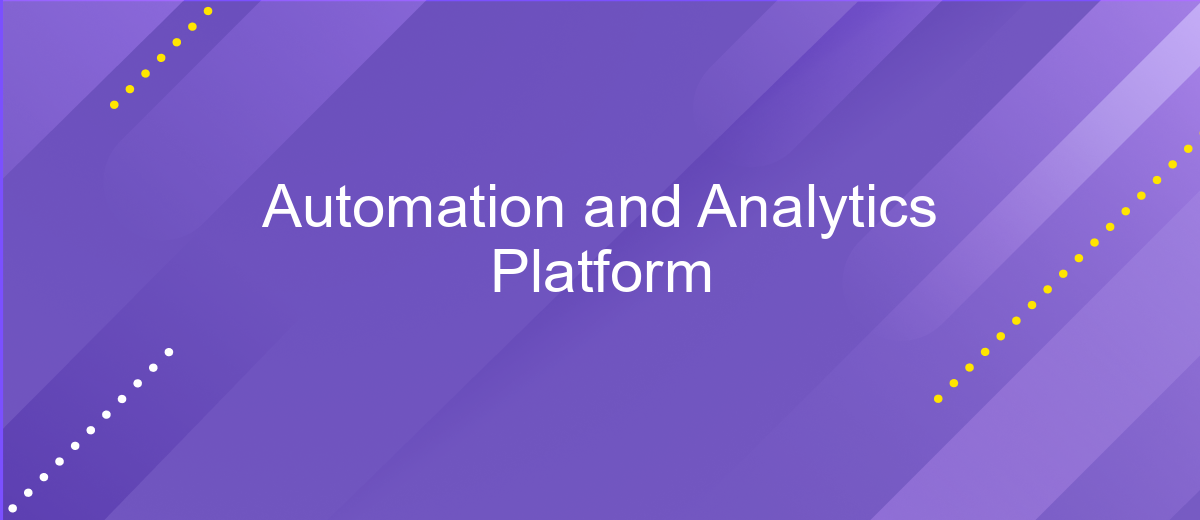Automation and Analytics Platform
In today's rapidly evolving digital landscape, businesses are increasingly turning to automation and analytics platforms to streamline operations and drive data-driven decision-making. These platforms empower organizations to enhance efficiency, reduce human error, and gain valuable insights from vast amounts of data. By integrating automation with advanced analytics, companies can unlock new opportunities for growth and innovation, staying competitive in a dynamic market environment.
Introduction
In today's rapidly evolving technological landscape, the integration of automation and analytics has become a cornerstone for businesses striving to enhance efficiency and decision-making. Automation and analytics platforms are transforming industries by streamlining processes, reducing human error, and providing actionable insights. As organizations seek to maintain a competitive edge, these platforms offer a comprehensive solution to manage and analyze vast amounts of data, enabling informed strategic decisions.
- Automation reduces manual intervention, increasing productivity and accuracy.
- Analytics provides deep insights into business operations, uncovering trends and patterns.
- Integration of both enhances real-time decision-making capabilities.
- Scalable solutions cater to businesses of all sizes, from startups to large enterprises.
- Improved data management leads to better compliance and risk management.
As we delve deeper into the capabilities of automation and analytics platforms, it becomes evident that their adoption is not merely a trend but a necessity. Businesses that leverage these technologies are better positioned to adapt to changing market dynamics, optimize their operations, and drive growth. This article explores the key features, benefits, and future trends of automation and analytics platforms, providing a comprehensive guide for organizations looking to harness their full potential.
Automation and Analytics Platform

Automation and analytics platforms are transforming the way businesses operate by streamlining processes and enhancing decision-making capabilities. These platforms integrate various tools and technologies to automate repetitive tasks, allowing organizations to focus on more strategic initiatives. By leveraging data analytics, businesses can gain valuable insights into their operations, customer behaviors, and market trends, enabling them to make informed decisions and improve overall efficiency. The seamless integration of automation and analytics not only reduces human error but also accelerates the time-to-market for new products and services.
One of the key components of a successful automation and analytics platform is its ability to integrate with existing systems and applications. Services like ApiX-Drive facilitate this by providing easy-to-use solutions for connecting disparate software systems. ApiX-Drive allows businesses to automate data transfers and workflows between applications without the need for extensive coding knowledge. This ensures that data is consistently updated across platforms, providing a unified view of business operations. By utilizing such integration services, companies can enhance their agility and responsiveness in a rapidly changing business environment.
Benefits of Automation and Analytics Platform

Automation and analytics platforms are transforming the way businesses operate by streamlining processes and providing insightful data analysis. These platforms offer a myriad of benefits that enhance operational efficiency and decision-making capabilities. By automating repetitive tasks, businesses can significantly reduce human error and free up valuable resources to focus on strategic initiatives.
- Increased Efficiency: Automation minimizes manual intervention, expediting workflows and improving productivity.
- Cost Reduction: By optimizing processes, businesses can lower operational costs and allocate resources more effectively.
- Data-Driven Insights: Advanced analytics provide actionable insights, enabling informed decision-making and strategic planning.
- Scalability: Automation platforms can easily scale to accommodate business growth, maintaining efficiency at higher volumes.
- Improved Accuracy: Automated systems reduce the risk of errors, ensuring more reliable and consistent outcomes.
Incorporating an automation and analytics platform into a business strategy not only enhances performance but also fosters innovation by providing a foundation for data-driven decisions. As companies continue to navigate an increasingly competitive landscape, leveraging these platforms becomes essential to maintaining a competitive edge and driving sustainable growth.
Use Cases

Automation and analytics platforms are transforming how businesses operate by streamlining processes and providing actionable insights. These platforms enable organizations to automate repetitive tasks, freeing up valuable resources and allowing teams to focus on strategic initiatives. By integrating data from various sources, they offer a comprehensive view of business operations, enhancing decision-making capabilities.
In diverse industries, the adoption of automation and analytics platforms leads to increased efficiency and productivity. Companies leverage these tools to optimize workflows, reduce errors, and improve customer experiences. As a result, businesses can remain competitive in a rapidly changing market landscape.
- In manufacturing, automation platforms help in predictive maintenance, reducing downtime and operational costs.
- Retailers use analytics to personalize marketing strategies, enhancing customer engagement and boosting sales.
- Healthcare providers implement automation to streamline patient data management, improving care delivery.
- Financial services utilize analytics for fraud detection, ensuring secure transactions and compliance.
Overall, the integration of automation and analytics platforms empowers organizations to harness data effectively, driving innovation and growth. As technology continues to evolve, these platforms will play a crucial role in shaping the future of business operations, providing a competitive edge to those who embrace them.


Conclusion
In conclusion, the implementation of an Automation and Analytics Platform is pivotal for modern businesses seeking to optimize their operations and gain valuable insights. By automating repetitive tasks, organizations can significantly reduce human error and increase efficiency, allowing employees to focus on more strategic activities. Furthermore, the integration of advanced analytics tools enables companies to make data-driven decisions, enhancing their ability to adapt to market changes and meet customer demands effectively.
Moreover, seamless integration of various systems is crucial for maximizing the benefits of automation and analytics. Services like ApiX-Drive offer robust solutions for connecting disparate applications, ensuring smooth data flow and communication across platforms. This connectivity not only streamlines processes but also enhances the overall agility of the business. As companies continue to embrace digital transformation, leveraging such platforms will be instrumental in maintaining a competitive edge and fostering sustainable growth in an increasingly data-centric world.
FAQ
What is an Automation and Analytics Platform?
How can automation benefit my business?
What types of tasks can be automated using these platforms?
How do I integrate different applications using an Automation Platform?
What are the analytics capabilities of such platforms?
Apix-Drive is a universal tool that will quickly streamline any workflow, freeing you from routine and possible financial losses. Try ApiX-Drive in action and see how useful it is for you personally. In the meantime, when you are setting up connections between systems, think about where you are investing your free time, because now you will have much more of it.

